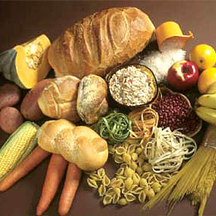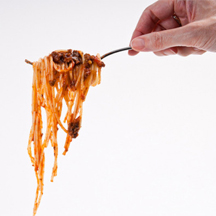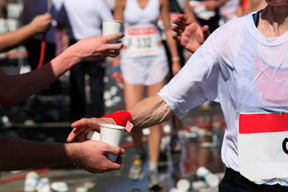Total Therapy Blog
Gearing Up for the Run… Carb Loading
 Welcome to our seventh part of “Gearing Up for the Run”. We are excited for the upcoming Vancouver Sun Run and hope you are too! Last article, we began to delve into the topic of nutrition and running. This week, we continue the nutrition talk, specifically about carbohydrate loading. If you have missed our previous 6 articles, you can find them here: Part 1, Part 2, Part 3, Part 4, Part 5, Part 6.
Welcome to our seventh part of “Gearing Up for the Run”. We are excited for the upcoming Vancouver Sun Run and hope you are too! Last article, we began to delve into the topic of nutrition and running. This week, we continue the nutrition talk, specifically about carbohydrate loading. If you have missed our previous 6 articles, you can find them here: Part 1, Part 2, Part 3, Part 4, Part 5, Part 6.
This past article, we provided some basic pointers in terms of what you can do for your diet to get the most out of your running program. This week, we’ll explore a popular topic – carbohydrate loading.
Carbohydrate loading refers to the practice of consuming large quantities of carbohydrates – the nutrients found in grains, starchy vegetables, and fruit – prior to an athletic event. Carbohydrate loading has been a popular past-time for professional athletes and weekend warriors alike. But…does it actually improve your race day performance?

Turns out, the short answer is yes. Research into sport nutrition supports the idea that elite athletes who consume high amounts of carbohydrates in the days leading up to an event perform better than those who don’t (http://www.ncbi.nlm.nih.gov/pubmed/7670450).
The longer answer is a bit more complicated. Carbohydrate loading does enhance performance, but the amount needed and how you should consume it are contentious issues. Most studies support the idea of calculating the carbohydrates needed based on per kg body weight per day. For women, it’s approximately 8 g of carbohydrates per kg body weight per day. For men, the recommendation is 10 g per kg body weight per day. The typical regime involves consuming these “extra” carbs 3 days before the race, around the same time as you’re winding down your training. This gives your body a chance to build up a surplus of muscle glycogen – the fuel stored in your muscles. The assumption is that the higher your muscle glycogen stores, the better your performance.
If this is starting to lose you, you’re not alone. This regime is tricky to grasp. Not only that, there’s not a lot of research based on the “average Joe”. In fact, most of the studies that advocate this regime looked at elite college track athletes and professional cyclists. What’s more, consuming too many carbohydrates can lead to water retention, which leaves you literally heavier and bloated. So what’s a recreational runner to do?

If you are going to carbohydrate load, do so in a smart way. As a rough estimate, the 60 – 70% rule is okay for most people (60 -70% of your caloric intake is comprised of carbohydrates). Also, know your body – if you get an upset stomach after downing an entire platter of rice, you might not want to do that before race day. Gradually build-up your carbohydrate load 3 – 4 days before the race. Add in carbohydrates into your diet through small, frequent meals spaced throughout the day. Consider adding in some extra protein instead of just adding carbohydrates – a recent study suggests that this doesn’t negatively impact race-day performance, and it speeds recovery post-exercise (http://bit.ly/gOoStm). Finally, take into consideration the type of race you’re running. If you’re participating in a 10 km fun run, chances are you won’t need to go crazy on the pasta. Conversely, you’ll want to pay special attention to your carbohydrate portions for longer-distance runs (e.g. marathons) or highly competitive races.
What’s your take on carbohydrate loading? Leave a comment in the comment section below!
Previous Parts: Part 1, Part 2, Part 3, Part 4, Part 5, Part 6.








Follow Us!
& Stay Up To Date
BLOG